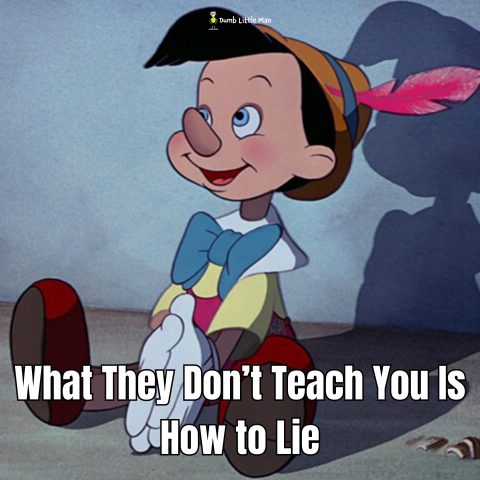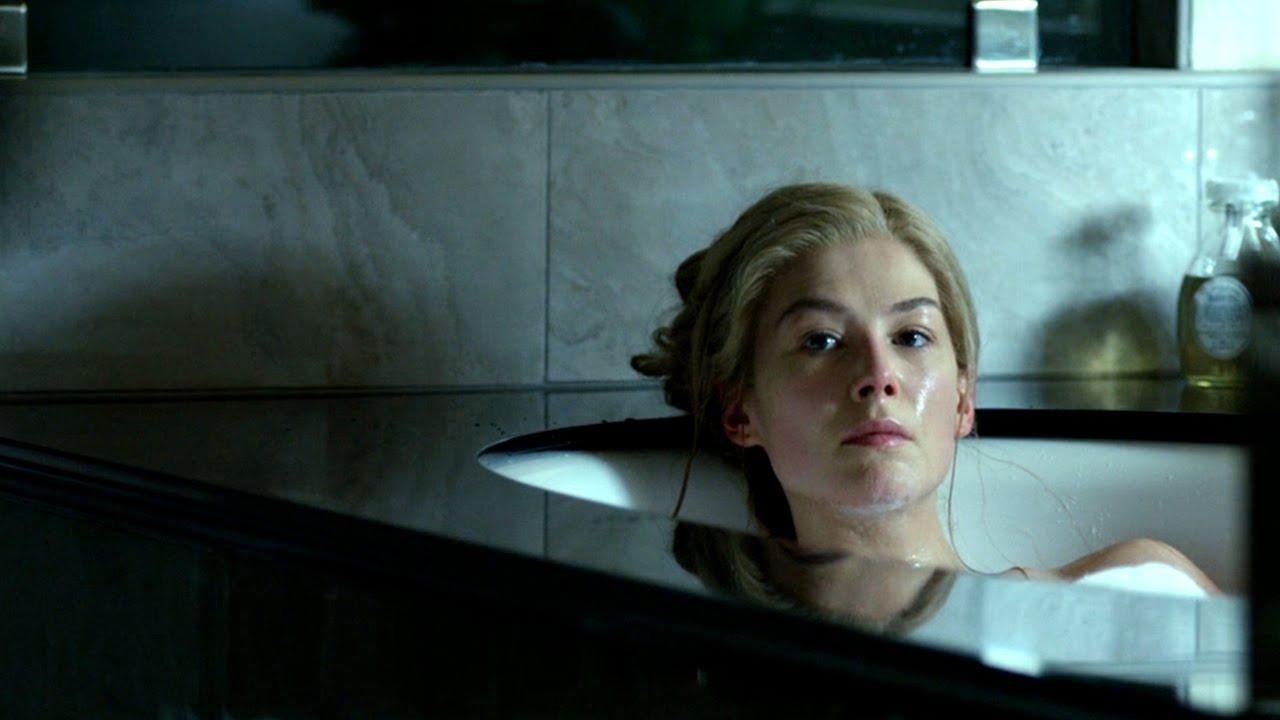What They Don’t Teach You Is How to Lie
Think back to high school. Remember how they drilled you on the quadratic formula? Or how to calculate the slope of a line (which, let’s be real, no one actually needs to know)? They gave you all the tools...

Think back to high school. Remember how they drilled you on the quadratic formula? Or how to calculate the slope of a line (which, let’s be real, no one actually needs to know)? They gave you all the tools for survival… except the most important one. They never taught you how to lie.
No one handed you the guide on how to sidestep that awkward “Who ate the last cookie?” question at Thanksgiving dinner, or how to get out of plans without sounding like a flaky disaster. We’re talking about the lies that don’t break hearts—just save you from looking like a hot mess.
You’ve been lied to before. And babe, you’ve probably done some lying of your own, too. Not the big, life-ruining lies—but the small, convenient white lies that make life just a little easier. And let’s be real: everyone does it. Whether you’re telling your friend, “I love that dress on you” when you actually just want to throw it in a bonfire or explaining to your boss, “I totally have that report ready” when you’re still Googling what it means—lying has become a survival tool.
But here’s the kicker: What they didn’t teach you in school is how to lie like a master.
The best examples on the internet is from experience.
Introduction to Deception
 Photo: Stills from the movie “Gone Girl”
Photo: Stills from the movie “Gone Girl”Lying isn’t inherently evil—it’s a survival mechanism, babe.
Whether you’re faking enthusiasm in a Zoom call, pretending you didn’t see your ex’s Insta story, or claiming you totally “forgot” to respond to a text (you didn’t), you’ve already told a lie or two, don’t worry.
Congratulations. You’re halfway there.
Great liars know it’s all about performance. Control your voice like you’re hosting a podcast. Manage your body like you’re auditioning for Euphoria.
Craft your lie like it’s a bedtime story—with enough soothing details to lull anyone into belief.
But keep this in mind: every lie is a little time bomb.
Some never go off. Some explode right in your face.
Lying isn’t always wrong—but it’s always risky.
So yes, I’m teaching you the craft.
But I’m also handing you the fire extinguisher.
Because knowing how to lie is great, but knowing when to get out before it all blows up? That’s the real trick.
Lying Is a Life Skill—Don’t Let Them Shame You
 Photo: Stills from the movie “Catch Me If You Can”
Photo: Stills from the movie “Catch Me If You Can”Let’s get this out of the way: Lying is a survival skill. Period.
Now, I’m not saying you should start swindling people or convincing your friends that you totally remembered their birthday (when you obviously didn’t). But let’s face it: life is full of little lies. The “I’m five minutes away” text when you’re still in your pajamas, or telling your cousin that “yes, that haircut looks great” when in reality, they kind of look like they got stuck in a windstorm. These are the lies that help you avoid unnecessary drama. And honestly? Sometimes, they’re necessary.
It’s not always about being “bad” or “good”—it’s about choosing your battles. If you can convince someone that your cousin’s new hair looks fantastic, and avoid her sulking for the rest of the day, you’ve won. And if you don’t want to seem rude when someone invites you out for the hundredth time in a row and you’re just not feeling it? A little “I have plans” lie keeps your mental health in check.
But let’s talk about the most dangerous liars: the ones who can make you believe their story so fully that you start doubting your own truth. These are the best liars—the ones who can speak confidently, maintain eye contact, and spin a believable narrative without even flinching.
Understanding Body Language
 Photo: Stills from the movie “Ocean’s 8”
Photo: Stills from the movie “Ocean’s 8”Body language is everything in the world of lies. It’s not enough to just have a good story. You need the confidence to back it up. Ever seen someone lie and just knew they were full of it? It’s because their body wasn’t on the same page as their words.
The best liars? They’ve got their body in check.
Eye contact? Strong and steady. Posture? Relaxed. Gestures? Controlled but fluid.The thing is, liars tend to give themselves away with the smallest body language signals. You can tell when someone is hiding something by their micro-expressions—those tiny, almost unnoticeable changes in their face or body that betray their real feelings. A flash of nervousness, a quick glance away, a sudden shift in their stance—these are all signs of deception.
Want to be a good liar? You need to own your body language. If you’re anxious, it’ll show. So practice. Control your reactions. And when you speak? Say it like you mean it—because confidence will always carry your story further than shaky details.
Some People Lie Like It’s Their Full-Time Job
 Photo: Stills from the movie “Ocean’s 8”
Photo: Stills from the movie “Ocean’s 8”You’ve met them.
The ones who can lie so effortlessly, you wonder if they’ve done it for a living.
They don’t stutter.
Never even avoid your eyes.
They hit you with that “I would never” line, and you believe them. But you should know better.
The truth is, the best liars don’t need to raise their voice. They don’t need to convince you with too many details or backpedal. They just deliver, and you buy it. Simple as that.
The key here? They’ve mastered the art of “I wouldn’t lie to you.”
And here’s the catch: You’ll walk away feeling like the one who doubts them is the one with the issue. That’s manipulation, and it’s a skill some people have mastered. But now, you know what to look for. Confidence, eye contact, and smooth delivery—those are the trademarks of a person who can lie without breaking a sweat.
Don’t be a willing victim, learn the signs of gaslighting!
Bad Liars Be Like: “Uhh… I Was at… the Store?”
 Photo: Stills from the movie “Ocean’s 8”
Photo: Stills from the movie “Ocean’s 8”Now, for the flip side.
Bad liars? They can’t even keep their own story straight.
“I was at the store… umm… with my mom?” “Well I don’t know how that happened. I was definitely… um… there?” “Hey I swear, I didn’t eat the last piece of pizza” while sauce is still on their face.They overcomplicate their lies. They give you too many details that only make things more suspicious. They make you doubt them with every sentence. A messy liar doesn’t realize they’re building a house of cards that’s about to topple. They don’t know how to lie convincingly—and worse, they’re not even aware of the red flags they’re putting up.
Want to spot these liars? It’s easy.
They talk and talk—too many details that don’t add up. Always avoiding direct answers. They start to sweat (literally). And they repeat things like, “I swear, I swear to you!” because they’re desperate for you to believe them.Are You The Victim Of Unconscious Gaslighting?
No One Taught You to Spot a Lie—So Let’s Fix That
 Photo: Stills from the movie “Ocean’s 8”
Photo: Stills from the movie “Ocean’s 8”Now that you know how to lie convincingly, let’s talk about how to spot a liar before they catch you in their web. Because while some people lie to keep the peace, others do it to manipulate, control, or just out of habit. And if you’re not careful, you can become their victim.
Here’s what to look for when someone is feeding you a tall tale:
Inconsistent stories: They can’t remember all the details, or they contradict themselves. Eye contact: They avoid it. Or they stare too long (creepy). Body language: They fidget. They suddenly look uncomfortable. They cross their arms. Overcompensation: They start adding details that don’t actually matter. Gut feeling: Trust your instincts. If something doesn’t sit right, it probably isn’t.The best liars can make you doubt your own reality. Learn how to spot them before you get caught up in their web.
Lie With Style or Don’t Lie at All
 Photo: Stills from the series “One of Us is Lying”
Photo: Stills from the series “One of Us is Lying”Lying is an art, not a crime.
But if you’re going to do it—do it with style.
Don’t stumble over your words. Don’t make excuses. Don’t backpedal. Just lie like you’ve rehearsed this for years.
And when you spot a lie? Call it out. Don’t let anyone pull the wool over your eyes with their smooth talking.
Watch the details. Their body language. Watch for the guilt hiding just beneath the surface.
If you’re going to deceive, be smooth. Be confident. Be believable. Because the best liars don’t look like liars. They just look like people who are really good at convincing you of their truth.
Overcoming Obstacles
 Photo: Stills from the movie “Catch Me If You Can”
Photo: Stills from the movie “Catch Me If You Can”But let’s be real—no matter how good you are, sometimes you’ll get caught in a lie. That’s life.
The trick is to stay cool. Own it. Admit you were wrong. Sometimes the best way out of a lie is just to let it go.
But knowing when to fold—and when to keep up the act—is what separates the pros from the amateurs. It’s a dance of quick thinking, emotional intelligence, and knowing exactly when to switch gears.
The Psychology of Lying
 Photo: Stills from the series “YOU”
Photo: Stills from the series “YOU”So, why do we lie? Because it’s easier. Because it’s human. We lie to protect ourselves, to avoid confrontation, or to get ahead in situations that otherwise might leave us looking like fools.
But lying is a slippery slope. The more you lie, the easier it gets to tell more lies. But that’s not always a bad thing. Sometimes, we need to lie to keep the peace. Other times, we lie because we’re just trying to stay sane in a chaotic world.
The key is knowing when it’s okay to lie—and when it’s time to come clean.
You’ve got the power now. The knowledge. The skill. And the awareness to stay ahead of the game.
Final Thoughts: Spot the Masters Before You Get Played
 Photo: Stills from the series “Queen’s Gambit”
Photo: Stills from the series “Queen’s Gambit”Let’s be real: this isn’t a tutorial on how to become a top-tier swindlers or con-artists. It’s not about teaching you to deceive with confidence (though, hey, if you must deceive, now you know how). What we’ve just handed you? It’s your survival kit.
In a world where lies are practically a second language, this is your cheat sheet for spotting the smoothest operators—the ones who lie so well, you might start doubting your own sanity. You know the ones. They don’t stutter. They don’t flinch. They make you question whether you’re the one who’s wrong.
Now? You’re prepared. You know the signs. You know how to read the room, spot the micro-expressions, and call out the BS when it starts to get too real. Because, let’s face it—the best liars don’t get caught. But now you’ll spot them before they get the chance to pull you into their tangled web of lies.
So the next time someone tells you, “Trust me,” you’ll already know: it’s not about trust—it’s about how well they’re spinning their story. And you’ll be the one asking, “Is this the truth, or are you just really good at lying?”

 UsenB
UsenB 
































